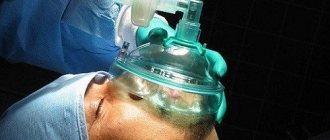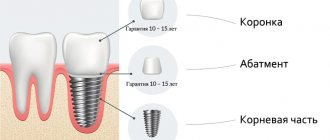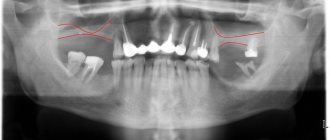Fixation of the titanium root in the jaw bone can occur by puncturing or cutting the mucosa, followed by the formation of a bed with a drill. In both cases, damage to soft tissues and blood vessels occurs, and active irritation of nerve endings occurs. During surgery, discomfort is relieved by anesthesia. After 1-1.5 hours, the effect of the anesthetics stops, and tissue sensitivity returns. Pain after dental implantation is a normal reaction of the body. The symptom requires attention because it reduces the patient’s quality of life, and sometimes indicates the development of early postoperative complications.
Causes of pain
During dental implantation, a foreign body is introduced into the alveolar ridge, which inevitably damages the gums, blood vessels, and bone tissue.
The body needs time to recover and adapt to the installed structure. At this time, inflammation develops in damaged tissues, which triggers the regeneration process.
Mechanical injury and fluid accumulation lead to irritation of nerve endings, which a person feels in the form of pain.
After suppressing the inflammation, the swelling goes away, the tissues are restored, and the discomfort gradually disappears.
"Normal" pain
The doctor always warns the patient about the occurrence of discomfort after the anesthesia wears off. Postoperative pain has the following characteristics:
- moderate strength;
- aching or cutting;
- weakens after using drugs.
The patient feels that the implants hurt after installation. But artificial roots do not have nerve endings. As a rule, the tissue in the area of implantation, the site of gum incision and sutures hurts. Irradiation (movement) of unpleasant sensations to nearby parts of the jaw, neck, ear, nose is possible.
Common Consequences
Problems may arise immediately at the time of intervention. The most common consequences include the following:
- Violation of the integrity of the nasal cavity and maxillary sinuses. Occurs due to unqualified actions of a specialist.
The mouth and nasal canals are located nearby and incorrectly calculated manipulations can damage them. To avoid this, X-ray examinations are required. This allows you to select the correct dimensions of structural elements. - Trauma to the nerve endings and bone tissue of the mandibular region. Occurs by analogy with injuries of the upper jaw.
It is complicated by the fact that under anesthesia the patient does not feel the traumatic load. But with severe injuries, sharp pain may occur, despite pain relief. This complication increases the recovery period. - Bleeding. During the intervention, the appearance of blood is normal.
Modern technologies reduce the risk of large blood loss. Bloody discharge in the first days after surgery is also normal. They should stop after a few days. If bleeding appears after a while, then this is a reason to consult a doctor. - Painful sensations. During implantation, metal elements are implanted into the bone tissue, which causes discomfort and unpleasant sensations.
They are not felt during the procedure due to anesthesia. But, after its effect ends, the pain makes itself felt. It should go away within a week, and after a while it is not felt even with pressure on the implant. But if this does not happen and every day it becomes more unbearable, then you should contact a specialist. - Removing the implant. This occurs when the tissue in which it is attached is severely damaged.
It also occurs due to inflammation and bone atrophy. In this case, the doctor prescribes a course of treatment, the results of which determine the possibility of re-implantation. - Injury to large blood vessels. Occurs infrequently, caused by non-standard implantation conditions.
How much does the gums and jaw hurt after implantation?
The most striking reaction of the body is observed in the first 1-3 days after surgery. At this time, the pain is severe and is present almost constantly. On days 3-4, the intensity of the discomfort decreases. The drugs help better, the patient notices periods of complete absence of discomfort. The pain becomes weak on days 5-7. After 10 days, most patients experience no discomfort. Mild discomfort may last longer in people with a lower pain threshold. As a rule, the patient does not feel the need to use painkillers.
General overview of the procedure
The process of implantation is a surgical procedure. Preliminary preparation is carried out, anesthesia is used (local or general), and all subsequent doctor’s instructions are followed.
The procedure itself takes a little time and looks like this:
- the operated area is numbed;
- a hole is drilled in the bone tissue in the desired area;
- The selected implant is inserted into the resulting channel and fixed in the jaw;
- Sutures are placed at the incision site.
In most cases, after the administration of anesthesia, the patient experiences virtually no pain.
If all the rules are followed by the doctor and the patient, the implant will be completely implanted into the jaw within six months. By this time he is ready to have a dental crown placed on him.
Signs of complications
Severe pain may indicate that something did not go according to plan after implantation.
The patient needs to pay attention to the nature of the discomfort and the presence of other symptoms.
You should urgently consult a doctor if the installed “artificial teeth” hurt in a specific way:
- there are bursting sensations;
- shooting pains;
- the patient cannot indicate the location of the discomfort;
- Painkillers don't help.
Warning symptoms also include:
- pronounced tissue swelling after day 7;
- large hematoma in the intervention area;
- discharge of ichor or blood after 3 days;
- increase in size of the postoperative wound;
- bad breath;
- numbness of the cheeks, lips, cheekbones;
- bloody and mucous discharge from the nose;
- discharge of pus from the gums.
In these situations, you need to contact your doctor as soon as possible and visit him for a follow-up examination.
Reasons for unfavorable outcome
The symptoms described above within the specified time frame indicate the normal course of the recovery period.
But if they are exceeded or other unpleasant sensations appear, then it is customary to talk about the appearance of complications. The causes of their occurrence are identified, which can be divided into three main groups.
Doctor's actions
Lack of professionalism and negligence of the specialist who performed the operation can lead to adverse consequences:
- Incorrectly selected method of implantation.
- Incorrect patient preparation.
- Low qualification of the dentist.
- Violation of sanitary and hygienic standards.
- Damage to the jaw bones.
The greatest risk is that not all complications that arise due to the doctor’s fault can be identified immediately. Some consequences are detected after a long period of time, which makes them difficult to eliminate.
Client actions
If the patient does not follow the doctor’s instructions after the intervention, this can lead to problems. Main violations:
- Failure to comply with the dosage of prescribed medications, consumption of food with an aggressive consistency
- Great physical pressure on the implant.
- No course of antibacterial therapy was given.
- Improper oral care.
- Abuse of alcoholic beverages and tobacco.
- Exposure to high temperatures at the surgical site.
- Delayed doctor visits.
Following the recommendations prescribed by the dentist disrupts your usual lifestyle, but at the same time reduces the risk of serious health problems. Therefore, the patient is required to follow all instructions for his own good.
Individual characteristics
Sometimes problems can arise due to the specifics of the patient's body. In this case there are no guilty parties. Such features include:
- allergic reactions to the materials from which the implant is made;
- problems with the immune system;
- specifics of the jaw bones;
- relapses of chronic diseases.
Why difficulties often arise when implanting anterior teeth and what types of systems are used.
In this article we will tell you what tests you will need to take before dental implantation.
Here https://zubovv.ru/implantatsiya/metodiki/planirovanie-beremennosti.html all the most important things about dental implantation during pregnancy.
What to do if it hurts a lot
Each patient receives recommendations from the doctor aimed at reducing discomfort in the postoperative period and reducing rehabilitation time. It is important not to cancel or replace medications without the permission of a specialist. Following the instructions exactly will eliminate severe pain.
After installing the implants it is necessary:
- Apply a cold compress immediately after surgery;
- 1.5 hours after the manipulations, start taking painkillers prescribed by your doctor;
- use prescribed antibiotics, observing the recommended frequency, dose and duration of treatment;
- Avoid drinking cold and hot drinks;
- Avoid crumbly, fibrous, spicy, hard foods;
- rinse the mouth after eating;
- sleep on your back or the side opposite to the intervention;
- exclude physical activity, overheating, hypothermia;
- stop smoking and drinking alcohol.
The cause of severe pain and postoperative complications is often the patient’s neglect of the doctor’s recommendations.
Norms and deviations
After prosthetics, the appearance of discomfort in the area of the installed implant, in most cases, is natural.
Prescription of medications and procedures allows you to return to a normal lifestyle in 4-5 days.
The table indicates when postoperative signs are natural, and situations indicating the development of a pathological process.
| Number in order | Type of symptoms | Physiological manifestation | Deviation from the norm |
| 1 | Painful sensations | The symptom may be localized or diffuse. Sometimes there may be irradiation into the nasal passages or auricle. | If the symptom does not go away after 4 to 5 days, then it becomes necessary to contact a medical facility. This may be the first signal about the onset of the inflammatory process. |
| 2 | Numbness | It is considered a physiological process and can be observed for 7 to 8 hours after the operation. This is due to the residual effect of local anesthetics. | Prolonged numbness (over 10 hours) can result from damage to the facial nerve. |
| 3 | Tissue swelling | The process will be natural if it occurs a few hours after surgery and goes away on its own after a week. | Persistent swelling that does not go away within 7 days indicates the beginning of the inflammation process. At the same time, it can spread to neighboring organs (swelling occurs in the nose area). |
| 4 | Bleeding | The first day after prosthetics, a small amount of blood is released due to the fact that the patient was taking medications that reduce blood clotting, thereby ensuring better engraftment of the artificial root. | The appearance of blood and bloody discharge on the second or third day is an alarming sign of traumatic vascular damage. This situation poses a risk of developing a hematoma (it tends to fester). In addition, the risk of seams coming apart increases significantly. |
| 5 | Temperature | For the first three days, the body temperature may be in the low-grade range (37 degrees). After this, the indicator gradually stabilizes. | Temperature jumps above subfebrile levels occur as a sign of the onset of inflammation. |
You need to know that the patient may experience discomfort due to the divergence of the sutures that are applied during the operation to give the correct position to the artificial structure.
This situation cannot be ignored, and therefore it is necessary to urgently seek help from a dentist.










